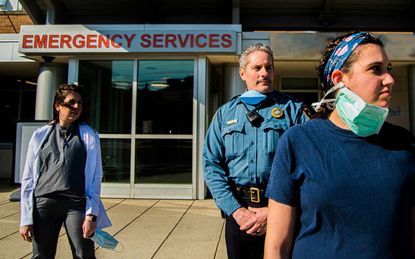
Parts of the massive federal stimulus passed by the House of Representatives focus on workers on the front line of the coronavirus battle.
When you purchase through links on our site, we may earn an affiliate commission. Here’s how it works.

While the latest stimulus bill being batted around Congress, the Health and Economic Omnibus Emergency Solutions (HEROES) Act, is stalled in the Republican-controlled Senate, the real heroes battling coronavirus on the front lines continue to fight the good fight.
And it’s here where inaction -- on the bill, which was passed by the Democratic-controlled House of Representative -- so far fails the health care workers and first responders (law enforcement officers, firefighters, paramedics, and emergency medical technicians) it is designed, in part, to help. But just how is the $3 trillion HEROES Act planning to benefit the front-line fighters? Part of the bill includes a $200 billion Heroes’ fund “to ensure that essential workers who have risked their lives working during the pandemic receive hazard pay.”
I have skin in this game. My daughter is a registered nurse whose job, in part, includes taking the temperature of anyone coming to the emergency room at the hospital where she works. So you can be darn sure I’m keeping an eye on the HEROES Act for my hero, and other health care workers and first responders. Here’s some of what the HEROES Act offers them.

Health care workers and first responders, including police and firefighters among essential workers, would be eligible for $13-per-hour pay bumps up to $10,000 (on top of their regular salary) as part of the HEROES Act. The pay would be retroactive to January 27, when the COVID-19 public health emergency was declared, until 60 days after the end of the emergency.
The employer would apply for the grants from the federal government to cover the pandemic premium pay for essential workers. The employees would see a separate line item on their paycheck showing this pandemic premium pay. Your boss would not be allowed to reduce any other pay or benefits because of this. The retroactive pandemic premium pay would come in a lump sum soon after your employer gets the grant. Oh, and yes: it would be taxable.

Included in the HEROES Act is $850 million going to the states to assist essential workers, including health care workers and emergency response workers, for child and adult care help, beginning January 21 of this year. Individual states would decide how the extra funding works; they could directly pay child care (as well as adult care) providers or reimburse workers directly if they pay for care themselves.

Looking for a job in the healthcare industry without the unbearable weight of student loans? The HEROES Act has a path. Included in the bill is the Public Health Workforce Loan Repayment Program, structured to “assure an adequate supply of and encourage recruitment of public health professionals to eliminate critical public health workforce shortages in local, state, territorial, and tribal public health agencies.”
Participants in the program must be accepted into an accredited educational institution or in the final semester of a program leading to a public health degree (health professions degree or certificate or a degree in computer science, information science, information systems, information technology or statistics). Once they accept employment with a public health agency and sign a contract to work there for two years or more, the Public Health Workforce Loan Repayment Program will pay off their student loans up to $35,000 per year of contracted service.
Bonus: Those who have worked in the public health workforce for the last 10 years are also eligible to have their student loans paid off through the Public Health Workforce Loan Repayment Program.